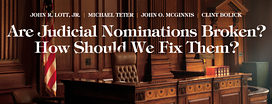Unfortunately, the twentieth century witnessed the collapse of the culture of originalism, which in substantial measure furnished the rule of law in constitutional cases, and the rise of non-originalist theories that justified, indeed celebrated, judicial discretion. If courts are going to decide abortion and same-sex marriage cases on the basis of their values or their perception of evolving values, the confirmation process will simply be confirming judges possessed of the values one favors.
Thus, I cannot agree with Clint Bolick that we should focus on appointing judges who will pursue a freedom agenda. I am myself a classical liberal and I am sure I would like the results of their decisions as a policy matter. But unless they also coincided with an accurate reading of the Constitution, I cannot approve of them as a constitutional matter. Our constitution creates a framework for government for people of differing values in many respects. The way to change that framework is to pass a constitutional amendment. Appointing judges who follow originalism will make it easier to engage in such a constitutional politics, which is where the politics of the Constitution should reside, not in judging.
While I agree with Professor Teter that reform to Senate rules may help confirm better judges, it will not address the root of the problems that make confirmations so contentious. The power of the federal government includes the discretionary authority of federal judges. That has been on the rise since the New Deal began the decline of originalism. It was exacerbated in the Warren and Burger Courts. It is hardly a surprise that in the aftermath of this transformation that our confirmation fights have become so bitter. So long as the Constitution is thought to be a vessel for updating the Constitution to capture the best values, the confirmation process will remain a matter of greater controversy.
In his response to John Lott’s reply, Professor Teter suggests that an “activist” judge is one who is willing to set aside the results of democratic decisionmaking. But that description is also the definition of a judge who is following his or her constitutional duty. Judicial review has bite only if judges decline to follow the enactments of the political branches when they violate our fundamental law, as well as uphold those enactments when there is no violation. Judges who require the federal government to respect its enumerated powers are no more “activist” than those who require the government to respect the Bill of Rights.

